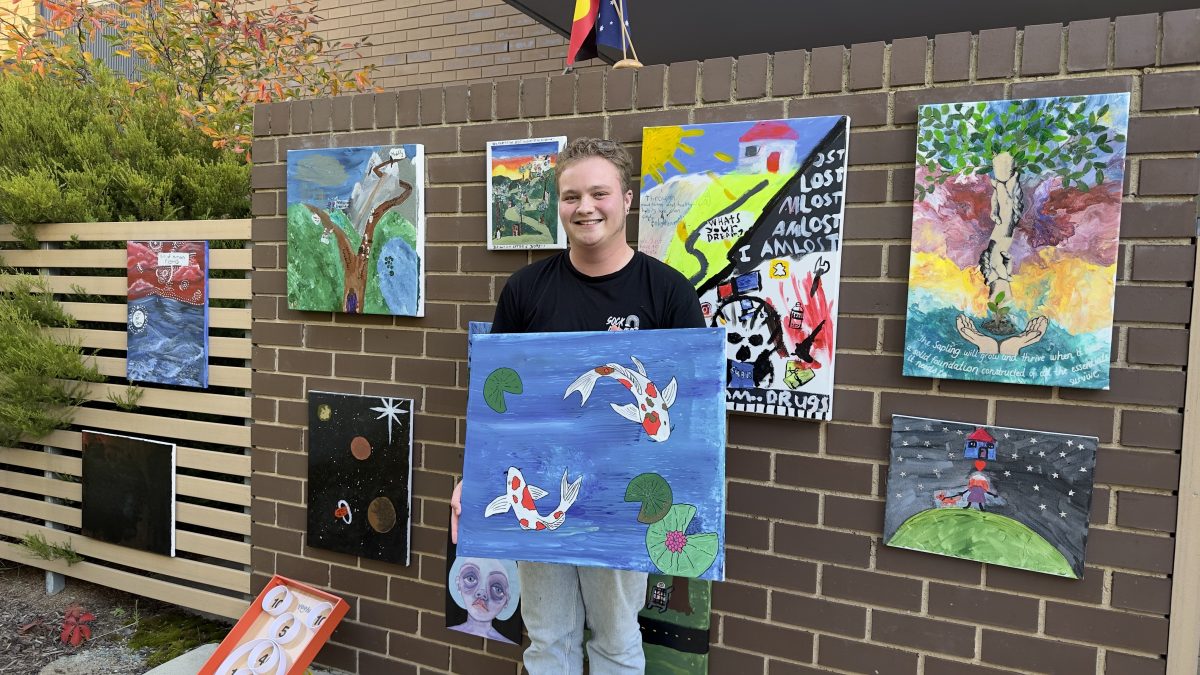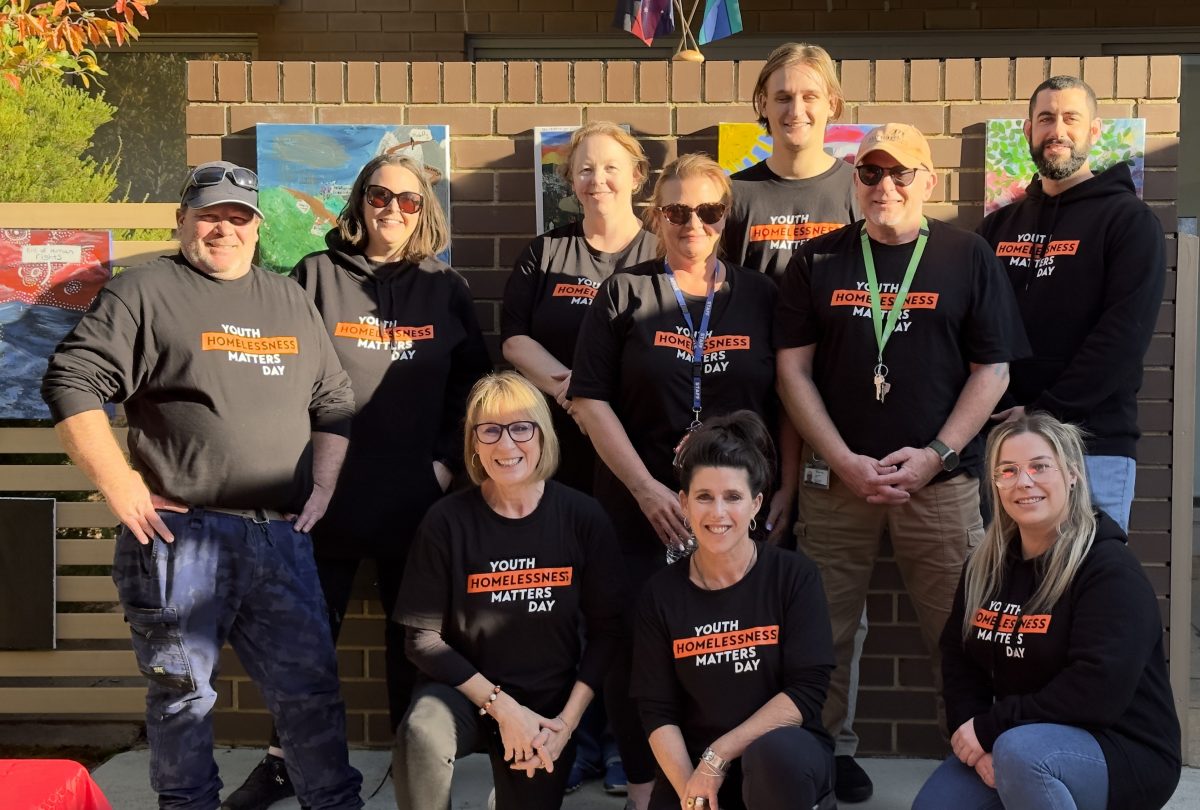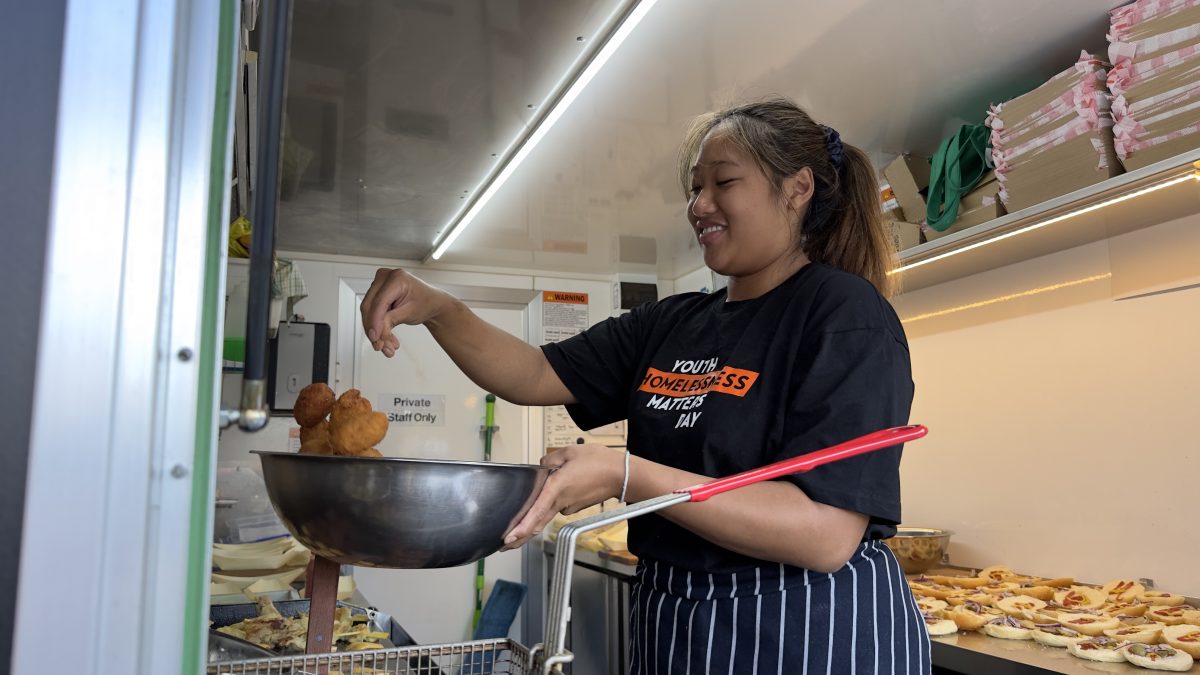
Nick Barker (pictured holding his COVID lockdown artwork) has been living at Our Place Youth Foyer for more than two years. Photo: Travis Radford.
Our Place Youth Foyer, an unassuming apartment complex in Braddon, has provided accommodation for homeless youth for the past decade.
Those who have been taken under the centre’s wing include people who had been couch surfing, staying with family friends, exploited in private rentals or had moved out of crisis centres.
“Just because you don’t see those young people doesn’t mean that they’re not there,” said Barnardos youth homelessness program manager Siobhan Cosgrave, who has supported more than 250 young people who have come through the Youth Foyer’s doors over the past 10 years.
“Most young people stay 18 months to two years and while they’re here, we focus on them working on their educational goals and their training goals, but also their life skills, as well as getting their health up to standard so they’re well and able to fit into the general community,” she said.
“So our goal is to get young people to be contributing socially and economically to the best of their ability by the time they exit the service.”

Youth homelessness program manager Siobhan Cosgrave (centre, first row) has been working with the Youth Foyer since its establishment. Photo: Travis Radford.
Nick Barker, who sits on the foyer’s youth advisory board and aspires to become a youth worker, has been a resident for more than two years.
“Homelessness in the ACT is such a hidden issue and it presents in many ways,” he said.
“I have a bed. Homelessness isn’t just living out on the streets. It’s us, it’s where we are.
“It’s really more prevalent than people think and there needs to be more funding.”
Mr Barker said before he entered the system, he didn’t know about the Youth Foyer.
“I didn’t think that there were as many services, particularly for under 18s,” he said.
“There’s definitely not many in the ACT, but services exist and support exists.
“You don’t have to face this alone, especially something as tough as homelessness.”
Ms Cosgrave said targeted early intervention, like the Youth Foyer service, could divert people like Mr Barker from the path of homelessness.

Peachee Food co-owner and former Youth Foyer resident Gee Khaing catered the anniversary event. Photo: Travis Radford.
Several Youth Foyer success stories, including former resident Maja Rathouski, who left home at 15 with a backpack and no plan after a family conflict, attended the low-key event at the Youth Foyer to commemorate its 10th anniversary and Youth Homelessness Matters Day (19 April).
“If you’re homeless, that’s where it starts. [A home] is the first thing that you need,” Ms Rathouski said.
“You’re not able to think about school or work or your passion or what you’re interested in because you’re in survival mode.
“The only reason that I came out the other end and made it such a great story or whatever you want to call it is because I had so many supports.”
Ms Rathouski said overcoming the stigma of homelessness and putting her hand up to ask for help had been the hardest part of her journey.
“[There’s a perception] that we might be misbehaving or not listening or a bad kid or really reckless,” she said.
“And I think we’re just learning as we become young adults and we’re all on our own journey.
“But that [doesn’t mean] you’re less worthy of having the stability of a house.”
But ACT Shelter CEO Travis Gilbert said it was becoming harder for young people to move on from homelessness services like Ms Rathouski did.
“What we’ve seen in the ACT over the last five years is a pretty significant deterioration in affordability in the rental market,” he said.
“[And property managers are] discouraging group homes because they can get a public servant couple in with perfect references.”
Mr Gilbert said the social housing waiting list was too long to be a silver bullet and suggested the ACT Government consider head leasing, an arrangement whereby the government or a community organisation rents a private property and then on-lets it at a subsidised rate.
“You might then be able to access properties in the private market but also educate real estate agents [about young renters],” he said.
“And it then provides the young person with an opportunity to demonstrate, ‘Well, yeah, I was able to live independently’.”













